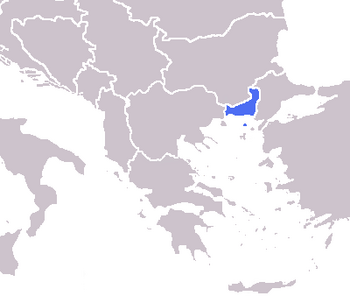United Nations Administration Mission in Thrace: Difference between revisions
Jump to navigation
Jump to search
No edit summary |
No edit summary |
||
| Line 29: | Line 29: | ||
}} | }} | ||
The '''United Nations Administration Mission in Thrace''', commonly referred to as '''UNAMIT''', is the officially mandated mission of the {{wp|United Nations}} in {{wp|Western Thrace}}. | The '''United Nations Administration Mission in Thrace''', commonly referred to as '''UNAMIT''', is the officially mandated mission of the {{wp|United Nations}} in {{wp|Western Thrace}}. The mission was authorized by the {{wp|United Nations Security Council}} following the conclusion of the [[Crskan War]] to deal with the disputed territory of Western Thrace. The UNAMIT describes its mandate as being to "help the United Nations Security Council achieve an overall objective, namely, to ensure conditions for a peaceful and normal life for all inhabitants of Western Thrace, facilitate a permanent political conclusion to the Greco-Bulgarian territorial dispute, and advance regional stability in the Western Balkans." | ||
Revision as of 11:25, 27 September 2023
United Nations Administration Mission in Thrace | |
|---|---|
|
Flag | |
 Locaiton of Western Thrace | |
| Status | United Nations mission |
| Capital | Komotini |
| Leaders | |
• UN Special Representative | TBD |
• NATO PKF Commander | TBD |
• EU Police Mission Head | TBD |
| Currency | Euro (EUR) |
The United Nations Administration Mission in Thrace, commonly referred to as UNAMIT, is the officially mandated mission of the United Nations in Western Thrace. The mission was authorized by the United Nations Security Council following the conclusion of the Crskan War to deal with the disputed territory of Western Thrace. The UNAMIT describes its mandate as being to "help the United Nations Security Council achieve an overall objective, namely, to ensure conditions for a peaceful and normal life for all inhabitants of Western Thrace, facilitate a permanent political conclusion to the Greco-Bulgarian territorial dispute, and advance regional stability in the Western Balkans."